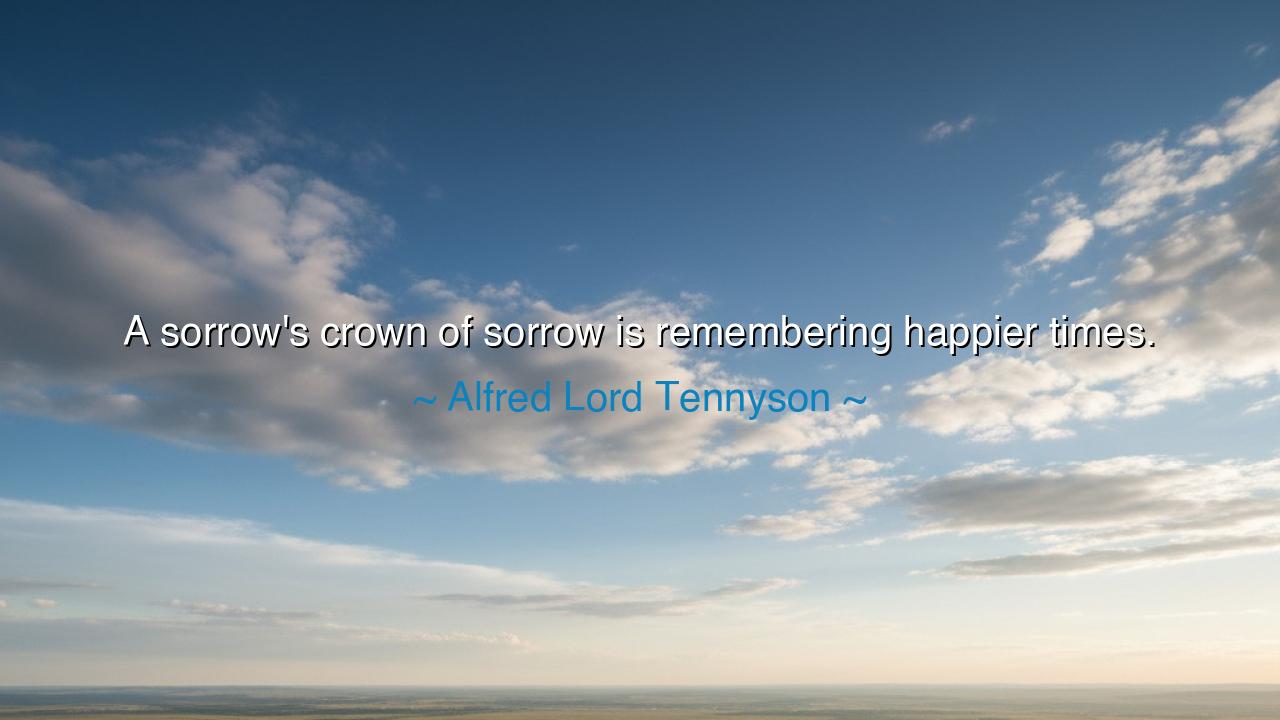
A sorrow's crown of sorrow is remembering happier times.






"A sorrow's crown of sorrow is remembering happier times." — Alfred Lord Tennyson. In these poignant words, Tennyson strikes at the very core of human grief. He speaks not just of sorrow, but of the bittersweet agony that comes when we remember times of joy now lost to us. It is one thing to suffer the weight of grief, but it is another, deeper pain to relive the happiness that once was, now gone. Tennyson's insight reminds us that the most painful aspect of loss is not merely the absence of what we loved, but the vivid contrast between the present suffering and the glory of what has passed.
This truth is timeless and echoed in the ancient tales of heroes and philosophers alike. Consider the story of Orpheus, the great poet and musician of Greek mythology. When Eurydice, his beloved wife, died, Orpheus' grief was profound. He journeyed into the underworld to bring her back, his music so moving that even the gods were swayed. Yet, as he neared the surface of the earth, he turned to look at Eurydice, and in that moment, she was lost forever. Orpheus' sorrow was not merely in her death but in the torment of remembering the joy they had shared, knowing that it was forever out of reach. This memory, once a source of comfort, became the crown of his grief, the sharpest sting of his loss.
In the Odyssey, Homer tells of the great hero Odysseus, who after years of wandering, longed to return home to his wife Penelope. Yet, even as he approached the end of his journey, he was haunted by the memories of the home he had left behind and the life that once was. His memories of Penelope’s love, of his peaceful kingdom, became a source of both hope and sorrow. The closer he came to home, the more he felt the sting of separation, for his journey was not only about returning, but about confronting the years of longing, the memories of a life that could never be fully restored. In Odysseus, we see how memory, though a beacon of hope, can also become a heavy burden, amplifying the sorrow of what is no longer.
Tennyson's words ring true in the life of King David as well. When his son Absalom was slain in battle, David’s grief was unbearable, but it was not merely the death that caused him anguish. It was the haunting memories of the times when he and Absalom shared joy, when father and son were united in love. The pain of David’s loss was compounded by the memories of the love that once was, of the dreams he had for his son’s future. The crown of his sorrow was not just in his son’s death, but in the recollection of their happier days together. In this, David's grief mirrors that of all who mourn, for memories of the past are not always a comfort, but a reminder of what we can never reclaim.
In our own lives, we often find that the pain of loss is not only felt in the present moment but in the memories we hold dear. It is natural to cherish the past, to hold onto the memories of happier times, yet these very memories can deepen our sorrow. Tennyson speaks of this universal truth—that the crown of sorrow is the burden of recollecting joy, now unattainable. Memory is a double-edged sword: it preserves the beauty of the past, but it also sharpens the pain of its absence. We long to hold onto what was, but in doing so, we often deepen our grief. The more we remember, the more we realize the fleeting nature of joy, and in this realization, the sorrow becomes even sharper.
Yet, there is wisdom in this sorrow. Tennyson’s quote does not simply dwell in despair; it invites us to recognize the beauty of our memories, even as we mourn. To remember happiness is to acknowledge that we have loved, and in this love, we have lived fully. Though these memories may bring sorrow, they also bring a sense of gratitude for the time we had. We should not hide from our grief or try to erase the memories that torment us, for in those very memories lies the evidence of lives well-lived, of moments of beauty that will never fade, even as time moves forward.
The lesson for us, dear listener, is that sorrow and joy are intricately woven together. Memory, in all its complexity, serves as a testament to what we have lost and what we have cherished. When we feel the sting of grief, let us not turn away from it, but embrace it as part of the full tapestry of our lives. In doing so, we honor not just our sorrow, but the delight that came before it. Let the memories of what was, however painful, guide us toward acceptance and gratitude. For in the end, we weep not only for what has been lost, but for the very love and joy that we were fortunate enough to experience.






AAdministratorAdministrator
Welcome, honored guests. Please leave a comment, we will respond soon